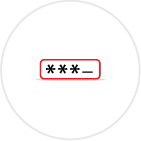For ProCredit Bank, controlling and avoiding cyber attacks is one of the main priorities. By investing in the latest technology and conducting regular technical checks, we ensure the protection and security of our customers' online banking information. In addition, we provide our customers with detailed information and advice on how to stay safe when banking online to prevent them from falling victim to fraud.
Any organization or individual can fall victim to cybercriminals. They become increasingly sophisticated in their efforts to trick people into clicking on suspicious links, downloading email attachments, or logging into social media, which are often used as channels to steal sensitive information.
To ensure that your banking information is highly protected, there are several measures you can take to protect yourself from common types of cyber attacks.
 Effective password
Effective password
 Safe equipment
Safe equipment
Keep your device secure and software up-to-date:
 Socially Engineered Attacks
Socially Engineered Attacks
Social Engineering Attacks are attempts to trick someone into giving out sensitive information (eg passwords) or doing certain actions such as phishing by contacting the individual to gain trust, download and execute files that appear to be harmless, but are actually harmful. Once the information is stolen, it can be used for fraud, to attack a computer system or network.
If you have any doubts about the validity of any email, text, or phone call that appears to be from ProCredit Bank and/or feel that you may have disclosed confidential information, please report it to us immediately by calling +355 42 389 389 or by sending an email to kujdesindajklientit@procreditbank.com.al.
Criminals use many methods of socially engineered attacks to steal information, such as:
Fraudulent Email (Phishing)
Phishing is a technique by which fraudsters attempt to obtain sensitive information by impersonating a legitimate business or reputable person in an electronic communication such as email, text message (SMS), phone call or instant messages. Often, they will present a link or plugin that looks like a valid and reliable source, but is actually a malicious site that steals and records any information you enter there, such as your password.
Here are some tips to protect yourself:
Never provide personal information including bank information (eg password, debit/credit card number, PIN, CVV2 code, etc.). For security purposes, ProCredit Bank will never ask for this information, neither by phone nor by email.
Spoofing website
Website spoofing is the activity of making a fraudulent website look exactly like a legitimate website. The goal of cybercriminals is to trick people into believing they are interacting with a legitimate, trustworthy company or person, causing them to share sensitive information or get malicious software onto their computers.
Here are some tips to protect yourself:
Never sign up for your online banking account by clicking on any email link. Always access internet banking by typing the address of the bank in your browser or using bookmarks. In case of doubt, contact ProCredit Bank at: +355 42 389 389.
 Always alert
Always alert
Protect your smartphone or tablet as you would your computer. Protect your digital wallet by using password, fingerprint or face recognition to unlock your phone screen.
Check account activity frequently to detect fraud early. We recommend that you check your e-banking account every week. Immediately report any suspicious or fraudulent activity to ProCredit Bank.
Avoid using mobile banking or sending sensitive emails or texts when using public or unsecured Wi-Fi networks.
Be extra careful if you are using equipment that is not your personal equipment and over which you have no control. ProCredit Bank recommends you avoid using such devices, as you never know if they may have malicious monitoring programs installed.
It is good practice to delete all information stored on your computer after your online banking session. Every time you access the Internet, your browser automatically saves copies of the web pages you have visited or the passwords you have entered on those web pages. Please refer to what your browser has documented in the disk memory.
 Other Proactive Measures
Other Proactive Measures
For more resources about Cyber Security, please refer to: